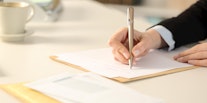How to Write an Appreciation Letter
- Why Would You Write a Letter of Appreciation?
- How to Write a Letter of Appreciation
empty
empty
empty
empty
empty
- Tips for Your Appreciation Message
- Letter of Appreciation Examples
empty
empty
empty
empty
empty
empty
- Frequently Asked Questions
- Final Thoughts
Why Would You Write a Letter of Appreciation?
In a time of constant communication, writing a thank-you or appreciation letter is becoming a forgotten art.
Yes, you might drop a vague 'thank you' into an email or conversation from time to time. But when was the last time you sat down to truly thank someone for their efforts?
Expressing gratitude is a wonderful way to develop personal and professional relationships.
In the workplace, there are endless reasons to send an appreciation letter, such as:
- Achieving goals or targets
- Continuously working well
- Working well as a team
- Surviving a difficult year
- Being a good person
- Recommendations
- Volunteering
You can also send thank-you letters for:
- Introductions
- Speaking invitations
- Helpful advice
- Personal favors
- References
- Someone having shown sympathy
- Attending events
By sending an appreciation letter to your colleagues or employees, you:
- Boost motivation and morale
- Make them feel valued
- Improve their job satisfaction
Appreciation letters are also a great way to further your career. By taking the time to write a well-written, grammatically perfect letter, you will stand out compared to your peers who lack this skill.
This article will teach you how to write a letter of appreciation and the top tips for producing a flawless letter, with personal and professional examples for inspiration.
How to Write a Letter of Appreciation
Your appreciation letter doesn't need to be long or handwritten on fancy paper, but you should consider the following:
Format
Are you sending a personal or professional email or letter?
An email is ideal if you want the recipient to receive your gratitude immediately. A personal letter is better suited for a friend, family member or close contact.
The professional business letter should be used for more formal situations, such as an employer, mentor or contact, addressed and printed on quality paper.
Tone
If you are close to the recipient, you can use more casual language. If they are a professional acquaintance, more formal language should be used.
Greeting
Professional letters should start with "Dear [title name]." Personal letters can use first names or nicknames if you are close to the recipient. Emails to colleagues can also use first names.
Message Body
Begin by stating why you are writing and the reason you are so thankful. For example, "I am writing today to thank you/show gratitude..."
Follow with more specific details about what they did and its impact. Conclude by reiterating your gratitude.
Sign-off
If this letter is to a friend or family member, sign off how you would a birthday card with one of the following, depending on the person:
- Much love
- All my love
- Love
- From
For formal letters and emails to colleagues, employees or other professional connections, use phrases such as:
- Respectfully
- Yours sincerely
- Best regards
Tips for Your Appreciation Message
Now you know how to write an appreciation letter, here are some tips to help you improve your writing:
-
Send the letter promptly to show sincerity – Sending a letter or email promptly shows the recipient that you genuinely appreciate them and their actions. If you are sending a letter to a colleague, mentor or new contact, it also shows them that you have excellent communication and self-management skills.
-
Be specific – Detail exactly what that person did and why it meant so much to you. Your letter shouldn't be long, but it should be detailed enough to demonstrate their actions and your gratitude.
-
Don't add unrelated information – There are two reasons for this. The first is that it shows your sincerity, as you have made an effort to contact them specifically for this reason. Adding in anything unrelated will take away from the message. The second is that the recipient might use this letter as evidence of performance and character in their portfolio. Any additional information might not be suitable for others to read.
-
Proofread – Before sending your letter, run your document through a spell checker or software like Grammarly. Alternatively, have someone else read it. Not only can they proofread for spelling and grammar, but they can check the content and sincerity.

Subject: My deepest thanks
Hi team,
I want to thank each and every one of you for all your hard work this year.
The constant changes in pandemic rules and lack of consistency have challenged us all. But the motivation, determination and compassion you have demonstrated this year are exemplary.
We achieved all our targets, created two incredible products and have taken teamwork to a new level.
I cannot thank or commend you all enough.
Thank you so much. I can't wait for next year.
Enjoy the holidays.
Yours sincerely,
[Supervisor name]
Subject: I couldn't have done it without you
Dear Samantha,
Thank you so much for your support this week. I don't know what I would have done without you.
Thank you for noticing that I wasn't at my best, thank you for reaching out and thank you for persevering.
I'm so used to dealing with things by myself, as I struggle to open up. But your kindness really did get me through a dark time.
I don't know what I can do to repay you, but I'm here if you ever need anything.
Thank you for being a friend.
Warmest wishes,
Julia
[Recipient address]
[Sender address – place this on the right]
[Date]Dear Dr Nameless,
I am so grateful for all your financial and educational support throughout my studies. Without it, I don't think I would have graduated.
You have been a wonderful mentor, and I have learned so much from you.
Your generosity and help have been an inspiration to me, and I plan on paying it forward when I become an attending physician.
Once again, thank you.
Best wishes,
Dr Doe
Subject: Wonderful to meet you
Dear Mr Surname,
Thank you so much for taking the time to talk with me at yesterday's graduate networking event.
I am grateful for the time you spent listening to my career goals and recommending ways of achieving them.
I especially appreciate the fact that you connected me with others in your network, and I plan on contacting them today.
Again, thank you so much for your help. I greatly appreciate the assistance you have provided me. I hope to cross paths with you again soon.
Yours sincerely,
Carli Lastname
Dear Aunt Sofia,
Thank you so much for my graduation present. It is absolutely perfect.
Your endless love and support have meant so much to me. I am where I am today because of you and my parents.
Can't wait to see you.
Lots of love,
Michael
[Interviewer address]
[Sender address – place this on the right]
[Date]Dear Ms Jackson,
I want to take this opportunity to thank you for my PR internship at WikiJob Media.
Because of this internship, I was able to work with several clients and had the chance to try different aspects of PR, including contacting the media, putting together a press release, organizing an event and working with influencers.
You and the rest of the team were extremely welcoming and helpful, and offered me so much useful career advice.
I have gained valuable insight into the PR industry over the past six months and can confirm that this internship has increased my interest in being a PR manager.
If it's okay with you, I would love to stay in contact and maybe speak to you about my next steps after graduation.
Once again, thank you for an incredible six months.
Yours sincerely,
Samantha
A letter of appreciation shouldn't be too long.
Your letter should be concise, specific and sincere. You shouldn't include any other information, as it takes away the integrity of your appreciation.
The body of the letter should include:
- The event for which you are grateful
- Why you are grateful
- Final expression of thanks
Yes, depending on the content and recipient, sending an appreciation letter via email is possible.
An email is appropriate for colleagues, managers and employees sharing thanks for a job well done, meeting targets or being a good person.
However, after a particularly successful or challenging year, an employer might want to send a formal business letter to employees to show appreciation.
Other instances where a formal letter is more appropriate include:
- To a mentor or contact that has helped you in your career
- After a multi-phase job interview
- Upon completion of an internship
The purpose of a thank-you letter is to let the recipient know that their efforts have been noticed and appreciated.
In the workplace, thank-you letters boost motivation, productivity and job satisfaction. They help deepen professional relationships and allow you to stand out against those who don't send thank-you letters.
Personally, they let friends and family know you love and appreciate the things they do for you.
You can show appreciation in words by writing a letter thanking the person and explaining why you appreciate them and what they did.
Include phrases such as:
- I cannot thank you enough
- I am extremely grateful
- Word cannot express how thankful I am
- I'll never forget your support
- You have my deepest thanks
Professional business letters or emails are the best way to professionally express gratitude. If it is a colleague you want to thank, sending an email is enough.
If you are thanking a manager, employer, mentor or connection, a professional business letter shows:
- Sincerity
- Self-management
- Motivation
- Integrity
Final Thoughts
Letting someone know you appreciate their actions is a guaranteed way to improve their day and motivate them to continue their efforts.
In a world where most communication is through email or text, a typed (or handwritten) letter will make that person feel extra special.
Next time a friend, family member, colleague or professional contact does something for you, take the time to write them an appreciation letter.




